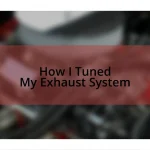Key takeaways:
- ECU adjustments significantly enhance vehicle performance, improving throttle response and fuel efficiency.
- Personal involvement in the ECU tuning process fosters a deeper connection between the driver and their vehicle.
- Careful research and collaboration with professionals are crucial to avoid common pitfalls and maximize the benefits of ECU adjustments.
- Keeping a log of settings and their impacts can provide valuable insights and guide future modifications.
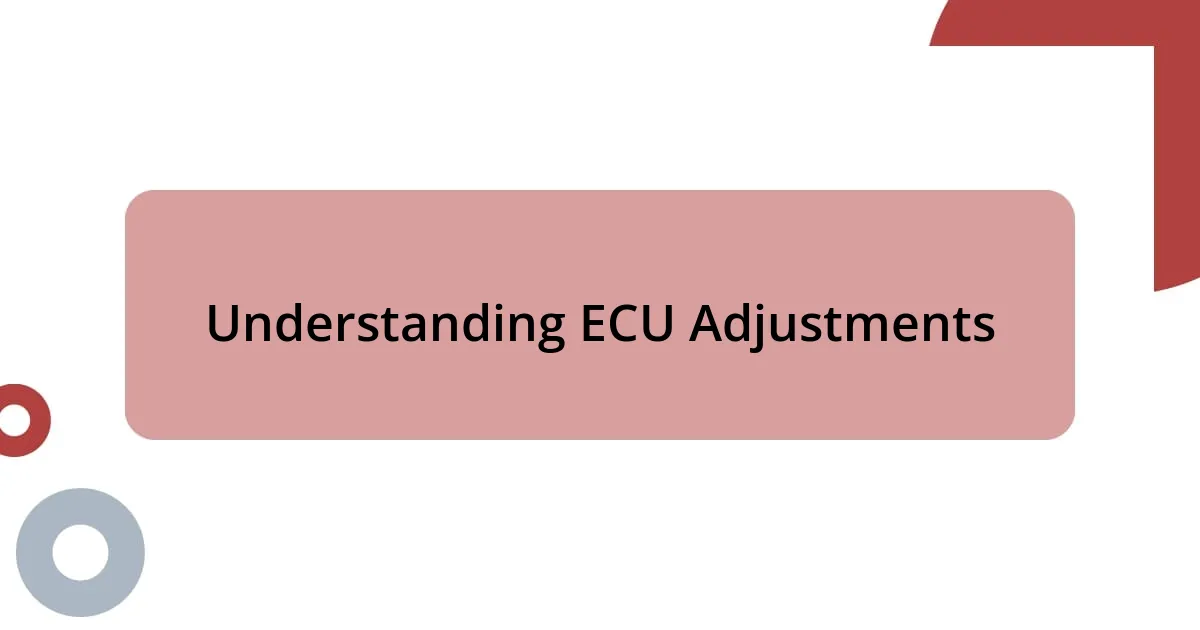
Understanding ECU Adjustments
Understanding ECU adjustments is crucial for optimizing vehicle performance. I still remember the thrill of feeling my car respond more eagerly after I had an ECU remap done. It was as if my vehicle had transformed overnight, delivering better throttle response and enhanced fuel efficiency.
Have you ever wondered how small changes in the electronic control unit (ECU) can lead to significant improvements? The ECU is essentially the brain of your vehicle; it manages everything from fuel injection to ignition timing. Adjustments can fine-tune these settings to better suit driving conditions, which is especially beneficial if you’ve upgraded components like the exhaust system or intake. I recall a time when adjusting the ECU made my car more suited for spirited weekend drives, which genuinely changed my driving experience.
The emotional connection many of us have with our vehicles can be strengthened through these adjustments. I felt a renewed sense of joy every time I hit the road, knowing my car was now performing better than ever. It’s fascinating to consider how something as technical as an ECU adjustment can evoke such a strong passion for driving.
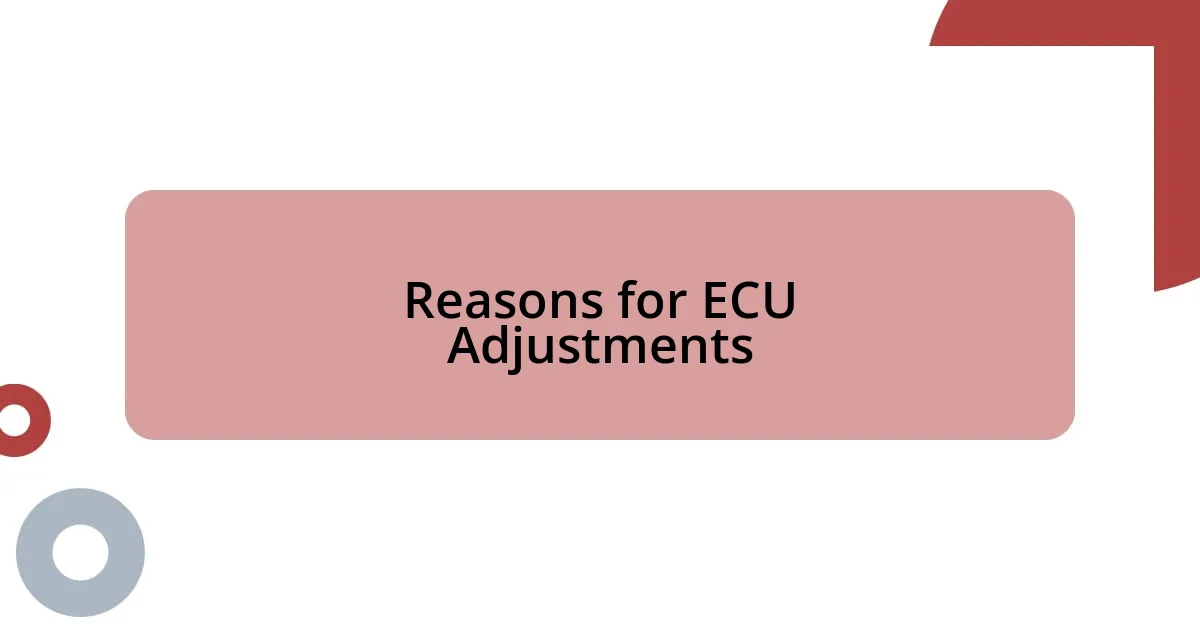
Reasons for ECU Adjustments
When I first delved into ECU adjustments, I quickly realized how crucial they are for a tailored driving experience. One primary reason for making these adjustments is to increase horsepower and torque. I can still remember the excitement of feeling my engine roar to life after tweaking the settings, making overtaking on the highway more exhilarating than ever.
There are several reasons why enthusiasts opt for ECU adjustments:
- Enhanced Performance: Better horsepower and torque contribute to a more thrilling driving experience.
- Fuel Efficiency: Optimizing fuel maps can lead to substantial savings at the pump.
- Customizing for Upgrades: If you’ve added performance parts, the ECU needs recalibration to maximize compatibility.
- Driving Conditions: Adjustments can be made based on whether you’re in city traffic or taking on winding mountain roads.
- Diagnostic Capabilities: An adjusted ECU can better diagnose and respond to engine performance issues.
Embracing these adjustments has transformed my relationship with driving, making every journey feel uniquely rewarding and engaging. Each tweak is like a personalized gift that keeps on giving, reminding me of the joys of automotive exploration.
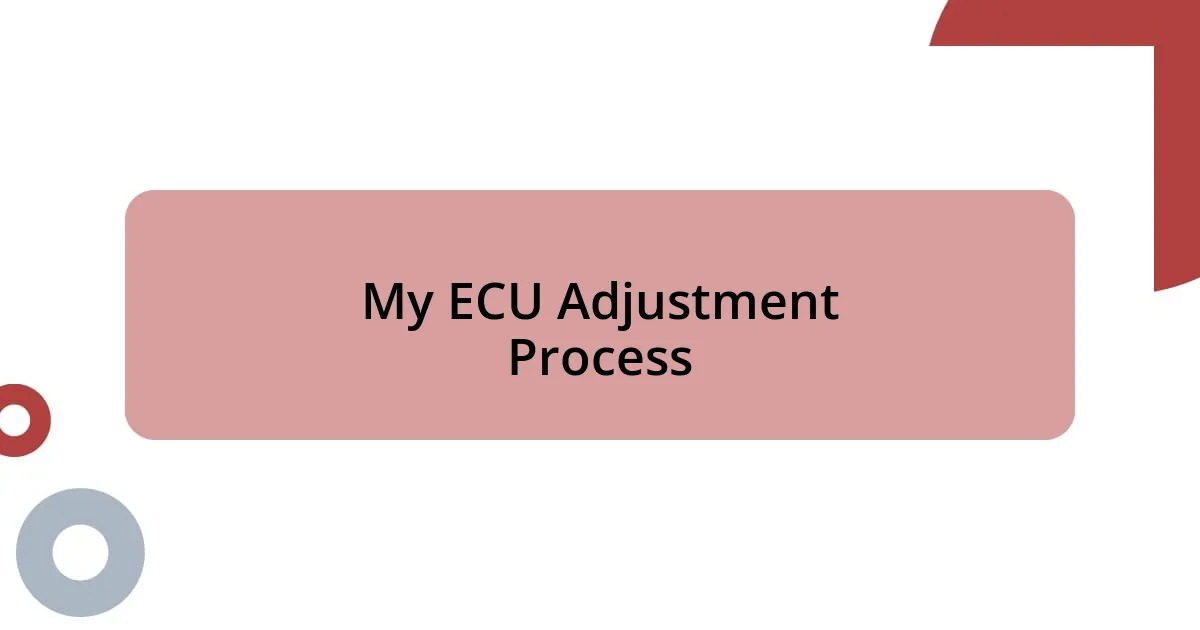
My ECU Adjustment Process
My journey with ECU adjustments has been quite interesting and transformative. The first step in my adjustment process involved a simple yet effective remap, which I learned was not just about numbers but about craftsmanship. I vividly recall the day I received the tuning file – it felt like unwrapping a gift. The anticipation was palpable, as I was eager to see how my car would respond. And let me tell you, the instant I hit the gas pedal after the adjustments, I was greeted with a newfound surge of power that made my heart race. How could a simple tweak in programming lead to such a thrilling experience?
In my experience, the actual process of ECU adjustment can seem daunting at first, but it’s crucial to approach it methodically. I remember spending hours researching the best tuning options for my specific vehicle model. It’s important to choose a reputable tuner who understands your car’s dynamics. When I finally decided on a custom tune, I was present during the whole process. Seeing the technician connect to my car, I felt an exhilarating mix of excitement and nervousness. And when it came time to test the results, I’ll never forget the joy of feeling every gear shift being smoother and more responsive, almost as if my car was communicating with me in a new language of speed.
Ultimately, the ECU adjustment process is about collaboration between the driver and the machine. I found that spending time optimizing settings tailored to my driving style truly connected me to my car on a deeper level. Each adjustment made me feel like I was part of the vehicle’s evolution. Was it the technical changes or the personalized touch that brought me closer? I believe it was both, and that’s what made this journey so rewarding.
| Step | Description |
|---|---|
| Remap Selection | Selecting the right tuning file that matched my performance goals. |
| Research | Understanding various tuning options and vehicle dynamics. |
| Involvement | Being actively involved in the tuning process for a tailored experience. |
| Testing | Testing the vehicle post-adjustment to feel the differences firsthand. |
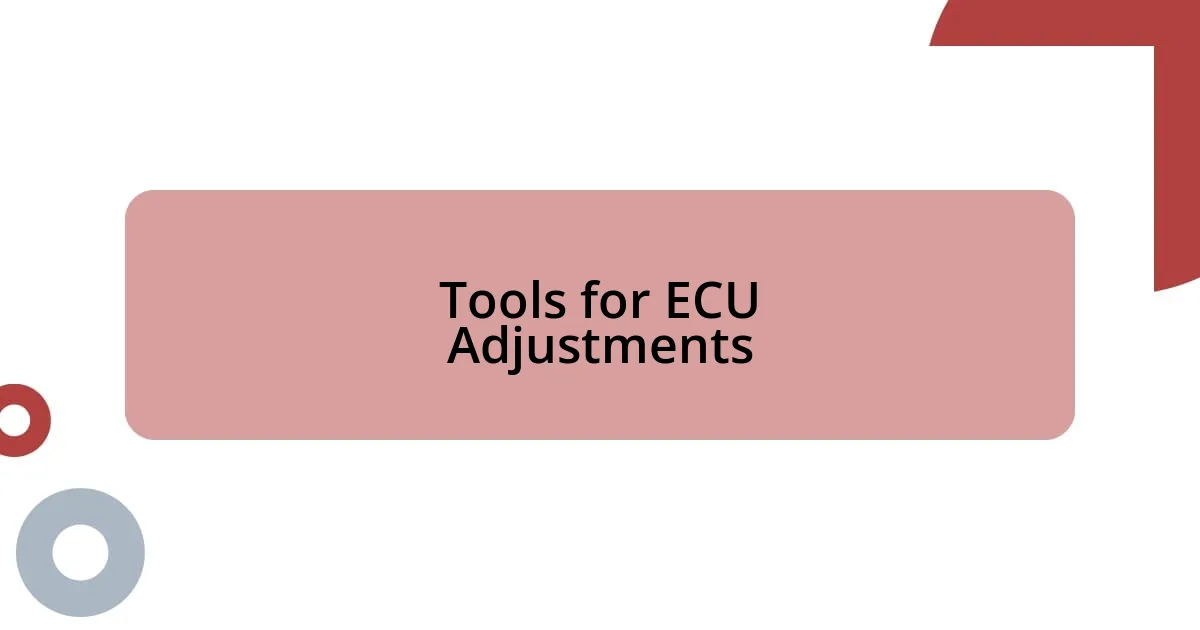
Tools for ECU Adjustments
When it comes to tools for ECU adjustments, having the right equipment is essential. Personally, I’ve found that an OBD-II scanner is invaluable. This handy tool allows you to read and clear diagnostic trouble codes (DTCs), giving you insight into what’s happening under your hood. I remember the first time I plugged it in; it was like opening a treasure chest of information that helped me troubleshoot my car’s performance issues.
For more advanced adjustments, I often rely on ECU tuning software. This software can unlock performance maps that tailor the car’s performance to my needs. Each time I tweak a parameter, I feel a sense of control over my driving experience. It’s fascinating how a few clicks can optimize fuel efficiency or unleash horsepower, making me eager to hit the road and feel the difference firsthand. Have you ever altered a setting and instantly felt it change your driving dynamics? I certainly have, and it’s one of the most gratifying aspects of this journey.
Then there are the hardware tools, like tuning chips and piggyback systems. I remember trying a piggyback ECU on a whim after hearing about its ease of installation. The thrill of instantly boosting my car’s performance with minimal effort felt like a cheat code in a video game. These adjustments reminded me that, with the right tools, a driver can transform a stock vehicle into something incredibly personalized and exhilarating. What tools have you found essential in your own ECU adjustment journey? Each experience can lead to discovering something new about our vehicles.
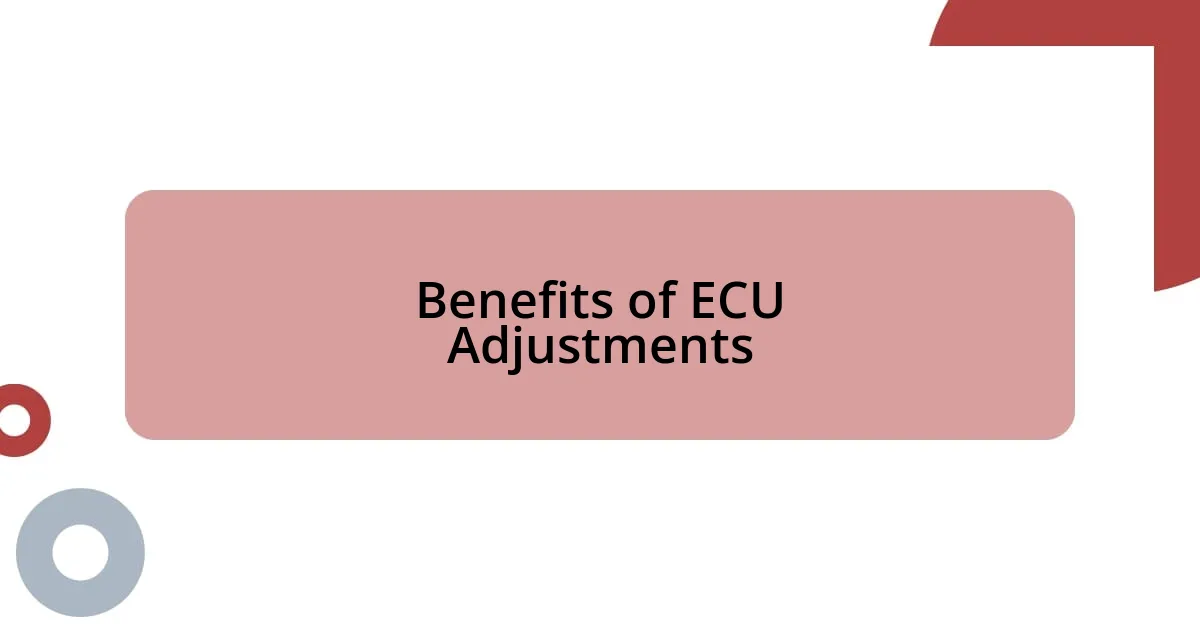
Benefits of ECU Adjustments
Adjusting the ECU has, without a doubt, brought a remarkable boost to my driving experience. One of the first benefits I noticed post-adjustment was the increased throttle response. I remember merging onto the highway and feeling the immediate punch as my car surged forward. That simple tweak turned the otherwise mundane act of merging into a thrilling acceleration. Isn’t it amazing how a digital change can redefine what we feel behind the wheel?
Another significant advantage has been the enhancement of fuel efficiency. I can’t tell you how many times I’d watched the fuel gauge dip too quickly for my liking. After the adjustments, I was pleasantly surprised to see better mileage. It felt like I was not only gaining power but also being rewarded for my driving habits. Could tweaking a few parameters really lead to savings at the pump? Absolutely, and it transformed my budget-friendly lifestyle into something more exhilarating while being economical.
Finally, the ability to customize my ECU settings to align with my driving style has been incredibly empowering. Initially, I was unsure how all those numbers and terms could reflect my personal preferences. But after some experimentation, I realized how responsive my car could become in various driving conditions. I distinctly recall adjusting the settings just before a road trip; the car felt like an extension of myself, perfectly tuned to my rhythm. Isn’t it wonderful when your vehicle feels tailor-made for you? That sense of connection is what I cherish the most from my ECU adjustment experience.
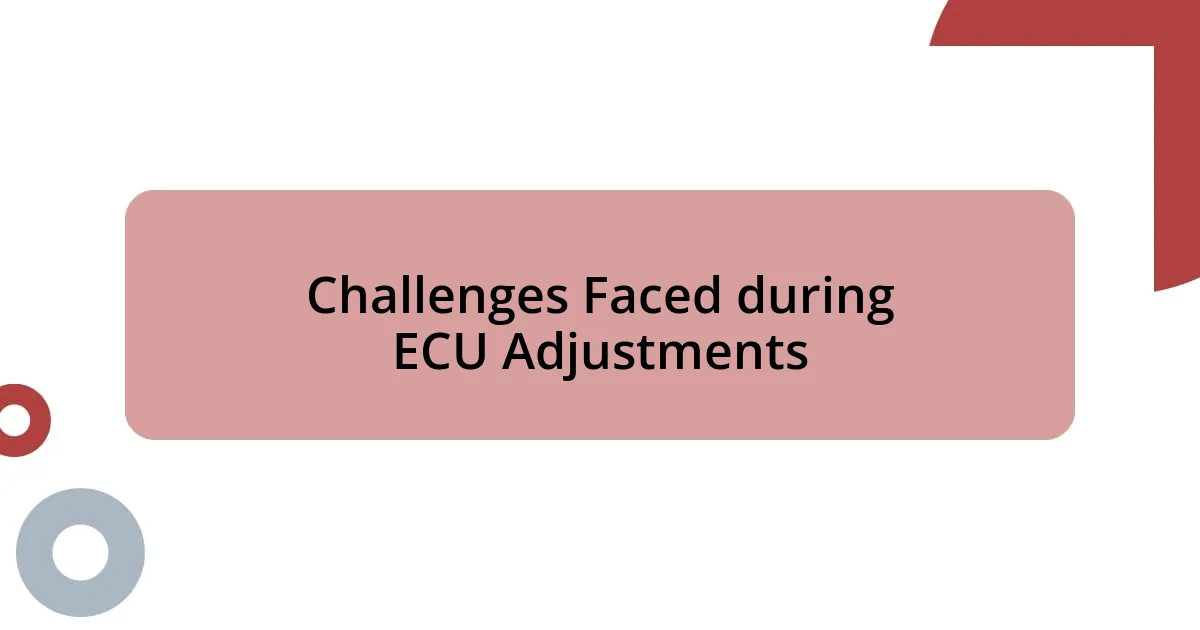
Challenges Faced during ECU Adjustments
When I first ventured into the world of ECU adjustments, the complexity of the software certainly threw me for a loop. Trying to understand parameter mappings and how slight changes could impact performance was a learning curve. I remember staring at the screen, feeling like I was navigating a labyrinth without a map—it was frustrating! Have you ever felt overwhelmed by a new tech venture? That was my first taste of this journey.
Another challenge I faced was the trial and error process that comes with fine-tuning settings. There were times when I’d adjust a value, thinking I was making a smart choice, only to have my car react unpredictably. I’ll never forget the day my adjustments made the engine hesitate at startup; it felt like a personal failure. How could a tiny tweak lead to such a dramatic reaction? This taught me the importance of patience and research—sometimes, you have to step back to leap forward.
Then, there’s the reality of compatibility issues with aftermarket parts. Early on, I installed a new intake system that I thought would seamlessly integrate with my ECU adjustments. Instead, I found myself staring at a dashboard filled with warning lights, which felt like a personal betrayal from my enhancements. Have you experienced frustration with parts not playing well together? It was a humbling reminder that every modification can have a ripple effect, and it necessitated an understanding of how each component interacts with the ECU.
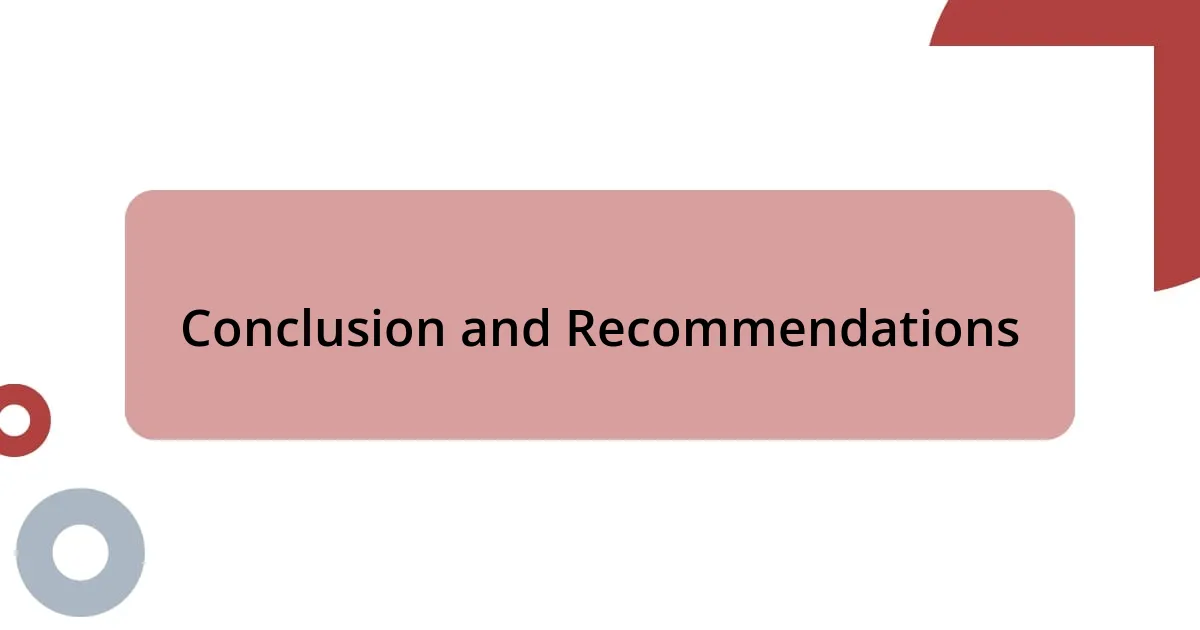
Conclusion and Recommendations
Adjusting the ECU has been a transformative experience for me, but it’s essential to approach these modifications carefully. I learned that extensive research before diving in can save you from the headaches I faced. Have you ever wished you’d asked for advice before making a change? I certainly did after realizing that a little knowledge could have avoided some of those frustrating moments.
For anyone considering ECU adjustments, I strongly recommend working with a professional rather than going it alone. I recall a time when I tried tweaking settings without guidance, and it resulted in frustrating delays and unexpected issues. How different would my journey have been if I’d sought expert help from the get-go? Honestly, I believe that collaboration not only enhances your car’s performance but also allows you to learn along the way.
In terms of ongoing adjustments, keep a log of your settings and the corresponding effects on performance. I adopted this practice after a few trial-and-error mishaps. It’s like having a roadmap for your vehicle’s evolution. Wouldn’t it be helpful to look back and see what worked and what didn’t? I find that this strategy not only provides insight but also deepens your appreciation for the adjustments you’ve made.













